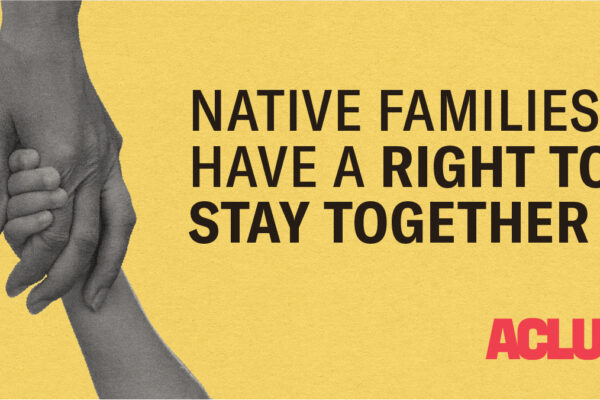The American Civil Liberties Union, along with the ACLU of North Dakota and multiple ACLU state affiliates and represented by Cooley LLP, filed an amicus brief with the U.S. Supreme Court today urging the court to uphold the constitutionality of the Indian Child Welfare Act. The Indian Child Welfare Act (ICWA) — which establishes basic requirements to protect Native American children from continued forced removal from their families, tribes, and tribal culture — is slated to be reviewed by the Supreme Court this fall via Brackeen v. Haaland.
The Indian Child Welfare Act was passed by Congress in 1978 to address the nationwide epidemic of American Indian children being forcibly removed from their homes by child welfare agencies and placed into non-Native homes at disproportionate rates. Throughout history, federal and state governments have sought to undermine and threaten the existence of tribes via the forced separation and assimilation of Native children. ICWA requires state courts to make active efforts to keep Native families together. The law aims to prioritize the placement of Native children within their extended families or tribal communities, where their cultural identities will be understood and celebrated. If the Supreme Court overturns ICWA, states would once again be allowed to indiscriminately remove Native children from their families and culture while simultaneously depriving tribes of future generations — putting the very existence of tribes in jeopardy.
“Throughout history, the United States government has enacted countless policies to steal Indigenous children from their homes and to erase their identities,” said Stephanie Amiotte, ACLU of North Dakota legal director and enrolled member of the Oglala Sioux Tribe. “The explicit goal of these policies was, and continues to be, the complete erasure of Indigenous people. If the Indian Child Welfare Act is overturned, tribes will again be stripped of their right to keep their families together. This is a tragedy as we know that having connection to our cultures, languages and identities is in the best interest of Native children.”
Tribes have an inherent right to govern themselves and make decisions on issues that affect their people — including Native children. The ACLU’s brief argues the Indian Child Welfare Act is constitutional and urges the Supreme Court to uphold the centuries-long legal precedent upholding tribal sovereignty — including tribes’ right and ability to preserve their unique cultural identities, raise their own children and govern themselves.
“We are honored to represent the ACLU in showing how the challenged provisions of the critical federal law protecting Native children are plainly constitutional,” said Kathleen Hartnett of Cooley LLP. “Native families have a right to stay together, care for their children and preserve tribal culture by ensuring access to their cultural identity, language and heritage.”
The brief was filed by the ACLU, ACLU of Northern California, ACLU of Alaska, ACLU of Arizona, ACLU of Maine, ACLU of Montana, ACLU of Nebraska, ACLU of New Mexico, ACLU of Oklahoma, ACLU of South Dakota, ACLU of North Dakota, ACLU of Wyoming, ACLU of Texas, ACLU of Utah, and ACLU of Washington. The Supreme Court will hear oral arguments in Brackeen v Haaland on Nov. 9, 2022.
A copy of the ACLU’s amicus brief is below.
About the ACLU of North Dakota
The American Civil Liberties Union of North Dakota is a non-partisan, nonprofit organization dedicated to the preservation and enhancement of civil liberties and civil rights. The ACLU of North Dakota is part of a three-state chapter that also includes South Dakota and Wyoming. The team in North Dakota is supported by staff in those states.
The ACLU believes freedoms of press, speech, assembly and religion, and the rights to due process, equal protection and privacy, are fundamental to a free people. In addition, the ACLU seeks to advance constitutional protections for groups traditionally denied their rights, including people of color, women and LGBTQ+ and Two Spirit communities. The ACLU of North Dakota carries out its work through selective litigation, lobbying at the state and local level, and through public education and awareness of what the Bill of Rights means for the people of North Dakota.
###
Stay Informed
Sign up to be the first to hear about how to take action.
By completing this form, I agree to receive occasional emails per the terms of the ACLU’s privacy statement.
By completing this form, I agree to receive occasional emails per the terms of the ACLU’s privacy statement.

